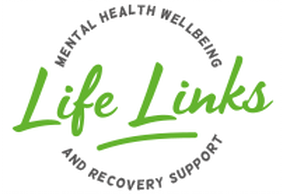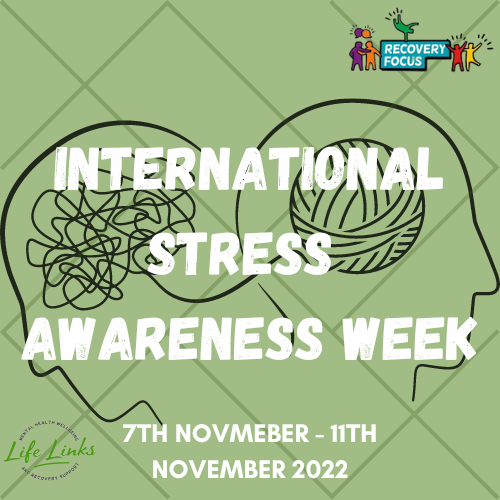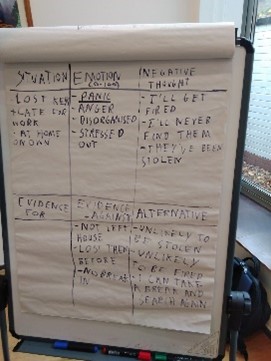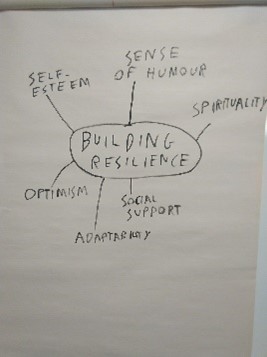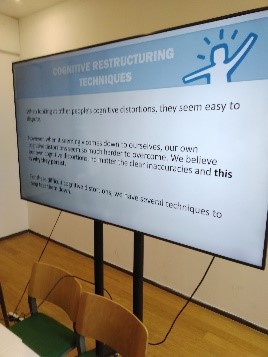On Monday 7th November we worked in collaboration with Age UK to present a workshop on Stress Awareness. We presented an activity-based workshop on using mindfulness techniques in the aid of stress reduction. We also held two workshops to the general public and one to Leicester City Council on Stress Awareness, where we covered psychoeducation of anxiety, as well as techniques people could use to reduce stress, including mindfulness and grounding.
Written by Emily
Recovery Worker
What is Stress Awareness Week
International Stress Management Association (ISMA) is a registered charity which promotes good mental health, wellbeing, and performance. ISMA created International Stress Awareness Week in 2018 and has been an international annual event since. This year, the campaign took place from Monday 7th November to Friday 11th November. The focus of Stress Awareness Week is to campaign against the stigma associated with stress and mental health issues, as well as raising awareness about stress prevention.
What is Stress
Stress is how we react when we feel under pressure or threatened and occurs when we are in a situation that we don’t feel we can manage or control. It’s our body’s way of responding to too much pressure. Therefore, when this feeling becomes overwhelming, when experience stress, which then activates our fight or flight response. This activation can then have a negative impact on our health.
What are the Signs/Symptoms of Stress
Stressors vary within everyday life and from person-to-person and in turn, almost anything can cause stress. Some people may be more susceptible to stress than others and will depend entirely on several factors such as your home life, your work, your childhood, and your personality. Henceforth, situations that may seem manageable to one person, may seem crippling to another.
Although these stressors can vary from person-to-person. Below are some signs and symptoms that may show you that you are under too much pressure:
Emotional/Cognitive Symptoms:
Worry
Irritability
Anger
Loss of Motivation
Difficulty Concentrating
Mood Instability
Decreased Sex Drive
Memory Problems
Physical Symptoms
Asthma
Headaches/Migraines
Back Pain
Sweating
Nausea
Indigestion
Chest Pain
Fatigue
Behavioural
Nail Biting
Restlessness
Teeth Grinding
Disrupted Sleep, Diet and Exercise
Interpersonal Conflict
Social Withdrawal
Substance Use
Procrastination
Why is Stress Management Important
Recognising the detrimental impact of stress on our daily lives and mental wellbeing is more important than ever. Three-quarters of the UK workforce are experiencing severe stress due to their work, feeling undervalued and at risk of burnout. According to an online poll undertaken by YouGov in 2018, 74% of people reported they were unable to cope with the levels of stress in their lives, thus highlighting the importance of stress management. The psychological effects of stress result in 61% of respondents feeling anxious, and a worrying 32% of people had suicidal thoughts.
How to Self-Manage Stress?
The emphasis of this campaign was on taking care of your overall wellbeing when dealing with the bouts of stress. Trying different techniques to better manage both our stress and mental wellbeing may work to then alleviate some of these symptoms and combat the stress response early.
However, like the signs and symptoms, techniques that work for one person, may not work for you, so it is important to try different techniques. By being mindful that your wellbeing is an ongoing process and its needs change over time, we can routinely check how we are doing and what makes us happy. Therefore, this gives us the ability to implement effective and comforting strategies that help you cope with stress.
Below are some techniques that can be used to reduce stress:
- Be kind to yourself – This is easier said than done, often requiring practice. However, by learning to be kinder to ourselves, we can largely reduce that negative self-talk and therefore, reduce stress levels.
- Keep active – This is not to say that it will diminish all stress. But even the smallest amount of exercise can help manage stress and provide a form of stress release.
- Get enough sleep – One of the most predominant symptoms within stress is difficulty sleeping. Not getting enough sleep can cause problems that worsen these feelings of poor concentration, low mood, and nausea.
- Find time to relax – Many of us have extremely busy lives, so finding time for breaks may seem impossible. However, regular short breaks to clear your mind can help change your perspective on a stressful event and give you some valuable emotional respite.
Organisations that can help:
Stress Management Society
The Stress Management Society is a non-profit organisation dedicated to helping individuals and companies recognise and reduce
Stress - Every Mind Matters
General information page with symptoms, definitions and psychoeducation about stress.
https://www.nhs.uk/every-mind-matters/mental-health-issues/stress
Mind
Explains what stress is, what might cause it and how it can affect you. Includes information about ways you can help yourself and how to get support.
https://www.mind.org.uk/information-support/types-of-mental-health-problems/stress
What Leicester Life Links did:
Stress Workshops:
International Stress Week Collaboration with Active Oadby and Wigston:
As part of International Stress Awareness Week, we worked in collaboration with Active Oadby and Wigston. On Tuesday 8th November, we ran a Grounding Workshop in Oadby where we spoke about what grounding exercises are and how to apply them to day-to-day life. The session was very engaging, and the group members formed peer discussions due to being very open to sharing their own personal experiences. On Wednesday 9th November, we ran a mindfulness in Wigston where we followed a mindfulness trail so that any skills learned in the previous workshop could be applied to the walk.
International Stress Week Collaboration with Active Oadby and Wigston:
Peer Support Groups
In line with International Stress Awareness Week, we covered various topics linked to stress in our Peer Support Groups. We covered resilience in our Creative Links, Men’s, and Older Adults Peer Support Groups. In our Hearing Voices Group, we ran a discussion-based session to which attendee’s shared their experiences of how stress impacts on their voices. The Walk and Talk group led a Self-Care and Gratitude session, where attendee’s discussed what self-care meant to them, as well as tips on how to practice self-care. In our Managing Anxiety Peer Support Group, we led a workshop-style session on Cognitive Distortions. We looked at unhelpful thinking styles and three techniques which can be used to combat these negative thoughts.
